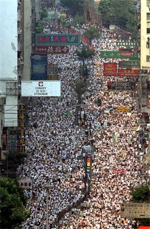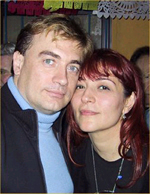
Alaa's angry. But he's a man who weaves eloquence from fury:
Holy anger is swelling up, not only against the perpetrators, but also against all who seek to find excuses, glorify the foul murderers by such appellations as "insurgents" or worst still "resistors" and such like; against the theorists and the "commentators"; against anybody who even shows indifference to such heinous butchery.Yet the decent majority of Mesopotamia will not bend to anything. The Genie has been released from the bottle and no force on earth can stop him.
All we can say is: Inna Lillah Wa Inna Ileihi Rajioun: "We are all to God, and to him we shall return."
Americans used their machines to rip down the statue of a gangster in Fardus Square. But it was Iraqis whom they were helping, who first took to the bronze themselves.

Last night I spied the accompanying photograph, taken from a Hong Kong demonstration of over 100,000 citizens protesting the Beijing-conspired erosion of their historically liberal British rule. Eight months later, Hong Kong's executive from Beijing, Tung Chee-hwa, has led observers to believe that he will resign.
Robert Mayer has now picked it up, linking to a blogger who believes China is simply pulling Tung for a ringer who might keep the former British colony quiet.
But for how long? The democratic watershed continues: though the requirements for numbers and patience are much higher in Hong Kong than Beirut or Kiev, we see that comparable results can be had.
He may come up short aligning foreign policy and national obligation when the present has departed from venerable past, but William F. Buckley can still cut a gem:
There isn't any way to send a banana through cyberspace, but that doesn't really affect the basic reason for free trade, which is the doctrine of comparative advantage. Even though there is a universalization of skills, in an age when anybody can type on a keyboard, the acquisition of such skills by a Third World country does not diminish the value of goods being produced, rather it adds to it. The worker in Central America can hope to buy the radio made in Japan, or the computer made in California.The proposition hasn't changed, that the difference between greed and husbandry has to do with the perspective of the critic. When a century ago we were shown the horseless carriage, we didn't think to focus on the greed of Henry Ford; we chose, rather, to applaud his ingenuity.
Buckley is speaking of free trade. But we see the keystone moral: Put the banana away. Close the disk drive.
Federal Reserve Chairman Alan Greenspan gave Democrats nothing of what they wanted a fortnight ago. Greenspan was demure last month. Today, he was crisp:
In his testimony Wednesday, Greenspan repeated a warning he first made a year ago, saying he believed the government had promised more than it could deliver to the 78 million baby boomers now approaching retirement and saying that cuts in benefits would have to be considered."If existing promises need to be changed, those changes should be made sooner rather than later," he told the House Budget Committee.
Greenspan reiterated that he supports President Bush's push for setting up personal retirement accounts by diverting up to 4 percentage points of payroll taxes into the new accounts.
..."In the end, the consequences for the U.S. economy of doing nothing could be severe," he said.
It's a bad day for the reactionary left, one of an estimated three hundred sixty-five this year.
BONUS: On a day when Greenspan judged the economy to be expanding at a "reasonably good pace," the Dow Jones touched 10,869 — its highest level since 2001.
It was just the other day when I found myself struck by the faintest sense that Steven Den Beste was due for a brief return to the national conversation. Here he is, as compelling as ever.

For nearly a year I've received through daily e-mails the most engaging and elucidating news on Iranians' plight under tyranny — and youth efforts to end an indenture with heresy into which their parents thoughtlessly entered twenty-six years ago last month — from activist Banafsheh Zand-Bonazzi. Today, in FrontPage magazine, Banafsheh and her husband Elio Bonazzi tell us their story, their purpose and their dream for Banafsheh's broken home.
This morning's guest on Bill Bennett's Morning in America radio show, Fox News anchor Brit Hume talked about his role in Fox's mid-1990s program lineup, weblogs, journalism, Lebanon and the Clinton press conference for whose abrupt end he was held responsible. Hume is a man most confident in his ability and the spirit of free speech; not at all intimidated by new media nor bloggers and the paradigm-shattering medius popularis they are becoming.
Most memorable? When Fox's fortunes went skyward, Brit recalled that he assumed his established, monolithically leftist broadcast and cable network competitors would follow suit and capitalize on the appeal of balanced coverage and increased exposure of rightist viewpoints. But — "you know what, Bill? They haven't."
And they've missed out.
Syria's answer has been delivered in Beirut:
Lebanese Prime Minister Omar Karami announced the resignation of his government Monday. "Since I was never attached to any position and I belong to a family that offered sacrifices for Lebanon, and since I am keen not to have the government posing as an obstacle for the good of the country, I hereby announce the resignation of the government," Karami told Parliament.
How utterly selfless of Karami, no? So Damascus gave parliament to Beirut. The Cedar Revolution has won its first victory, and now inherits its second challenge of forming an independent governmental authority and constitutionally reestablishing Lebanese polity, while the world waits for Bashar Assad's response to the repeated question, "why haven't your soldiers left Lebanon?" A statement from President Bush, both congratulating the Lebanese and sternly warning Assad against subversion or any further invasion of Lebanon's sovereignty, would be most welcome now.
Two possibilities seem fairly clear in the first moments after the collaborators' resignation: the first, that Syria resists its situation, confronting Lebanese patriots; or the second, that Bashar Assad withdraws politically and militarily, hoping that he can placate Washington, Baghdad and Jerusalem if he tucks his tail firmly enough. President Bush's strong words would add likelihood to the second of the two, an enormous favor for Lebanon; and the White House's decision on diplomatic status will tell us whether Syria's hostility to the civilized world might finally be judged.
RELATED COMMENTARY: Introducing category Lebanon's Cedar Tree.
WE HAVE A STATEMENT: From White House Press Secretary Scott McClellan, the anticipated message of congratulations and warning:
The resignation of the Karami government represents an opportunity for the Lebanese people to have a new government that is truly representative of their country's diversity. ...The new government will have the responsibility of implementing free and fair elections that the Lebanese people have clearly demonstrated they desire. ...We believe the process of a new government should proceed in accordance with the Lebanese constitution and should be free of all foreign interference. That means Syrian military forces and intelligence personnel need to leave the country. That will help ensure the elections are free and fair.
A personal delivery from the president should follow soon.
ALL ROADS LEAD TO ROME: Once again, Robert Mayer has tied all the latest news and opinion together with one knot.
'NO ONE CAN INTIMIDATE US ANYMORE': When fear went bust in Iraq, it was only a matter of time before other Near Easterners applied purple ink to their own circumstances. And embraced unity:
In Martyrs' Square a week before, during the first protest held after Hariri's assassination, a sea of flags for different political parties marked the demonstration.Monday's protest was dramatically different; it raised only one flag: that of Lebanon.
In freedom, we laud the distinct origin and common horizon.
Saddam Hussein in a steel cage? No, it's not what you think; in a show of mercy undeserved by Iraq's twenty-five-year oppressor, Baghdad authorities will take protective measures to ensure that Hussein is the hangman's, and the hangman's only.
No muted trumpet necessary. But then the old Ba'athist does have a bit of a "history."
Lebanon's groundswell for independence has been dubbed the "Cedar Revolution." Robert Mayer is ably compiling news reports with others; I will apply a few points to the question of Syria's plans for Beirut's parliamentary struggle. Damascus patsies have retreated from an earlier promise to stage a counter-demonstration, while Syrian muscle has yet done nothing to protesters defying a congregational ban in numbers reported to be many tens of thousands. President Bush's deployment of Deputy Assistant Secretary of State David Satterfield confirms the White House's interest in events. A subordinate envoy demonstrates the administration's suitably low opinion of Damascus strongman Bashar Assad — to be watched, not flattered. And Satterfield's prepared comments bear evidence that Bush has placed Lebanon squarely in his inaugural vision:
Lebanon should not be excluded from the trend of freedom and democracy that is sweeping the region, from Pakistan to the Palestinian territories ... especially as Lebanon has a long history in democracy.
Finally, opposition leaders are certain they can bring down the collaborator parliament with or without Robert's Rules of Order. Scattered reports of Syria making preparations to play long ball only strengthen the observation that Bashar Assad will give the Lebanese their polity by vote and try to take it back with subterfuge and force. But with nationalists like Walid Jumblatt calling Damascus out for its stall, and increasingly impatient and sausive Israelis on one side and Iraqis on the other, we may be watching Damascus bluffing with a bad hand, Assad's words for Rafiq Hariri's assassination — "political suicide" — his own epitaph.
